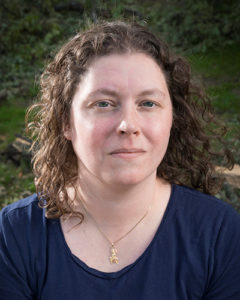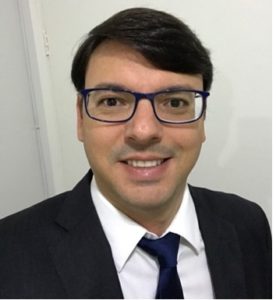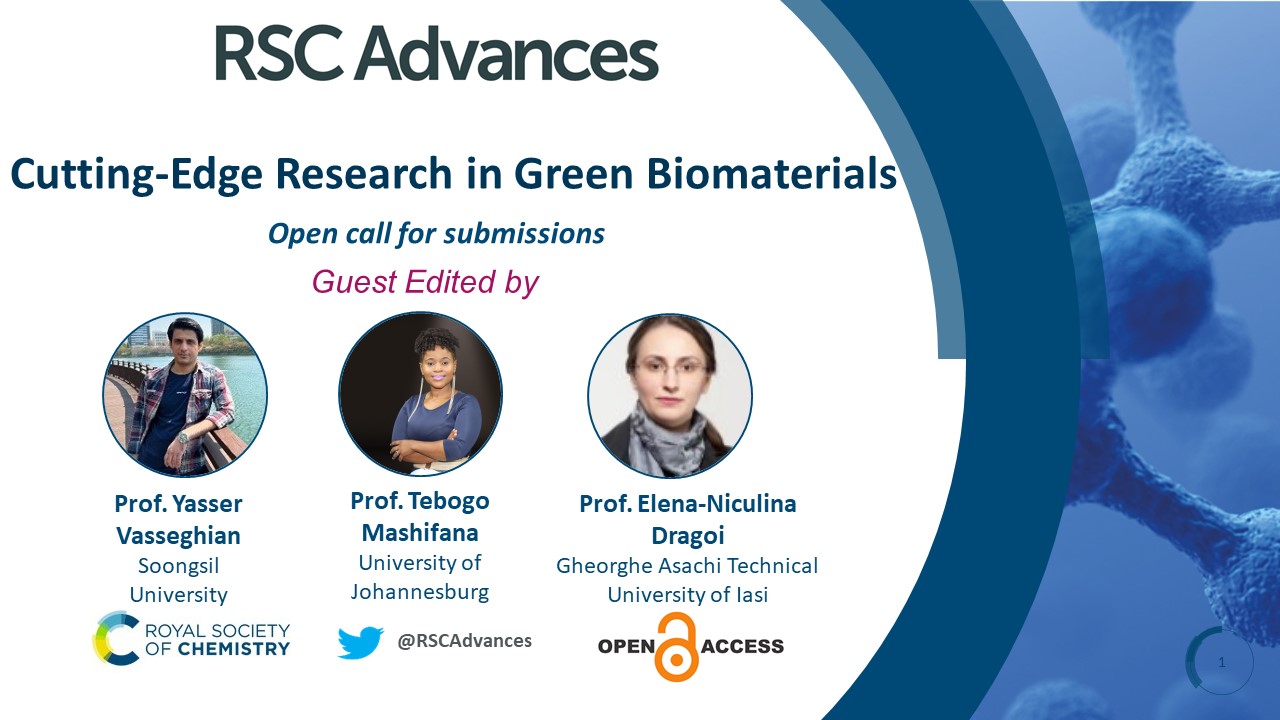We like to highlight the Outstanding Reviewers for RSC Advances in 2022! Each one of our outstanding peer reviewers has been carefully selected by our editorial team and the list includes active researchers who have made significant contributions to peer review and have gone above and beyond in their actions. Please see our editorial for more about our outstanding reviewers.
RSC Advances 2022 Outstanding Reviewers:
Dr Takumi Abe, Okayama University, ORCID: 0000-0003-1729-1097
Dr Federico Bella, Politecnico di Torino, ORCID: 0000-0002-2282-9667
Dr Sambasiva R. Bheemireddy, Amionx, Inc., ORCID: 0000-0003-1169-9649
Dr Shreyasi Chattopadhyay, University of St Andrews, ORCID: 0000-0003-4429-6117
Dr Marek Ingr, Tomas Bata University in Zlín, ORCID: 0000-0001-6741-9955
Dr Xiaochen Ji, Xiangtan University, ORCID: 0000-0001-9533-0376
Dr Pavan Kumar Chityala, BioMarin Pharmaceutical Inc., ORCID: 0000-0003-3339-2920
Dr Maxim L. Kuznetsov, Instituto Superior Tecnico, ORCID: 0000-0001-5729-6189
Dr Jianbo Liu, Hunan University, ORCID: 0000-0001-8282-4078
Dr Masato Miyauchi, Japan Tobacco Inc., Tobacco Science Research Center, ORCID: 0000-0001-9005-9855
Dr Wenxuan Mo, South China University of Technology, ORCID: 0000-0001-9341-500X
Dr Dane Scott, Scott East Tennessee State University, ORCID: 0000-0003-0018-7189
Dr Harvijay Singh, Indian Institute of Technology Roorkee, ORCID: 0000-0002-8370-2037
Professor Carlos Torres-Torres, Instituto Politécnico Nacional, ORCID: 0000-0001-9255-2416
Dr Werner Ewald van Zyl, University of KwaZulu-Natal, ORCID: 0000-0002-2012-8584
Dr Anna S. Vikulina, Friedrich-Alexander-Universität Erlangen-Nürnberg, ORCID: 0000-0001-9427-2055
Dr Yunchao Xie, University of Missouri, ORCID: 0000-0001-6216-1211
Dr Zhi Yue, University of Chicago, ORCID: 0000-0002-4231-7474
Dr Li Zhang, Shanghai Second Polytechnic University, ORCID: 0000-0001-5774-4068
RSC Advances Reviewer Panel 2022 Outstanding Reviewers:
Dr Sohini Bhattacharyya, Rice University, ORCID: 0000-0002-4626-1578
Dr Guillermo Bracamonte, National University of Cordoba, ORCID: 0000-0003-4760-3872
Dr Bin Chang, King Abdullah University of Science and Technology, ORCID: 0000-0003-4510-0550
Dr Lopamudra Das Ghosh, Texas A&M University, ORCID: 0000-0003-3867-6711
Dr S. Girish Kumar, RV College of Engineering, Department of Chemistry, ORCID: 0000-0001-9132-1202
Dr Darrick Heyd, Ryerson University
Dmitry Kharitonov, Jerzy Haber Institute of Catalysis and Surface Chemistry, Polish Academy of Sciences, ORCID: 0000-0003-2071-3975
Dr Gaurav Kumar, DuPont de Nemours Inc Water Solutions, ORCID: 0000-0001-7089-6146
Dr Shota Kuwahara, Toho University, ORCID: 0000-0001-7089-6146
Dr Hu Li, Guizhou University, Center for R&D of Fine Chemicals, ORCID: 0000-0003-3604-9271
Dr Jianmin Li, Zhejiang University, ORCID: 0000-0002-3917-8653
Dr Feng Li, The University of Sydney, ORCID:0000-0003-4448-074X
Dr Guangchao Liang, Xidian University, ORCID: 0000-0001-7235-958X
Dr Ekkenhard Lindner, Institut für Anorganische Chemie, Universität Tübingen
Dr Lingaiah Maram, University of Health Sciences and Pharmacy in St Louis, ORCID: 0000-0003-1327-8426
Professor Angel Meléndez, Universidad Industrial de Santander, ORCID: 0000-0002-5166-1840
Dr Wenli Pei, Northeastern University, ORCID: 0000-0003-2525-152X
Dr Abhispa Sahu, American Nano LLC, ORCID: 0000-0002-3223-7577
Dr Paresh Kumar Samantaray, Chemistry and Chemical Engineering, California Institute of Technology, ORCID: 0000-0003-2533-929X
Professor Beatriz Sánchez, Universidad de Alcala de Henares, ORCID: 0000-0002-6584-1949
Dr James Sheehan, The University of Alabama, ORCID: 0000-0001-5548-8099
We would like to take this opportunity to thank all of RSC Advances‘ reviewers for helping to preserve quality and integrity in chemical science literature. We continue to work on improving the diversity of our reviewer pool to reflect the diversity of the communities that we serve.
If you would like to become a reviewer for our journal, you can fill out an application. Or, please see our author and reviewer resource centre, for more information and guidance.

Comments Off on RSC Advances Outstanding Reviewers 2022




















